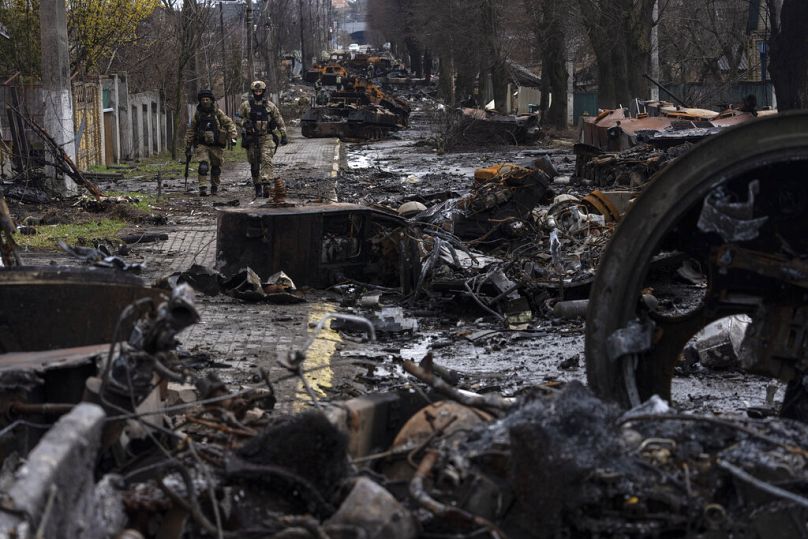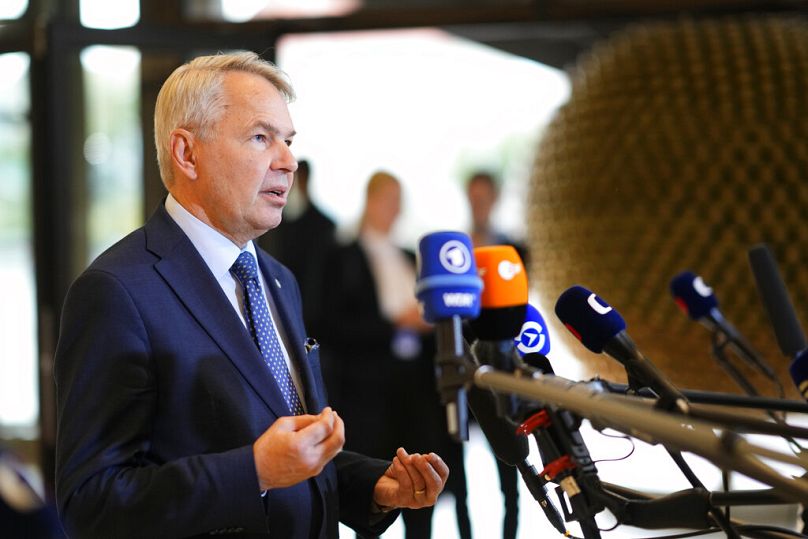Here's the latest developments you need to know from Ukraine and Russia.
1. Zaporizhzhia nuclear power plant's integrity 'violated,' says UN inspection team chief
The head of the UN nuclear agency on Thursday said the "physical integrity" of a Russian-held Ukrainian nuclear plant had been "violated" following frequent shelling on his team's first visit to the facility.
 ADVERTISEMENT
ADVERTISEMENT
 ADVERTISEMENT
ADVERTISEMENT
"It is obvious that the plant and physical integrity of the plant has been violated several times," IAEA head Rafael Grossi told reporters after returning to Ukrainian-controlled territory.
A UN inspection team arrived at Ukraine's Zaporizhzhia nuclear power plant Thursday on a mission to safeguard it against catastrophe, reaching the site amid fighting between Russian and Ukrainian forces that prompted the shutdown of one reactor and underscored the urgency of the task.
The visit from the 14-member expert delegation from the International Atomic Energy Agency came after months of negotiations to pass through the front lines and get inside Europe's biggest nuclear plant. Arriving in a convoy of SUVs and vans, the inspectors were led by IAEA director Rafael Grossi.
Earlier in the day, Grossi reported that the group had collected important information on its first tour at the plant and a part of the mission would continue its assessment "until Sunday or Monday" to continue the assessment, without specifying their number.
"My team is staying on, and more importantly ... we are establishing a continued presence by the IAEA here,'' he said in a video on Twitter, the plant visible behind him.
As the experts made their way through the war zone toward the complex, Russia and Ukraine accused each other of shelling the area and trying to derail the visit. The heavy shelling delayed the team's progress toward the plant.
Energoatom, Ukraine's state nuclear power company, said Russian mortar shelling had led to the shutdown of one of its reactors by its emergency protection system and had damaged a backup power supply line used for in-house needs. One of the plant’s reactors that wasn’t operating was switched to diesel generators, Energoatom said.
“There has been increased military activity, including this morning until very recently," Grossi said during the journey, adding that after being briefed by the Ukrainian military he decided to keep moving despite the risks. "Weighing the pros and cons and having come so far, we are not stopping.”
The Zaporizhzhia plant has been occupied by Russian forces but run by Ukrainian engineers since the early days of the 6-month-old war. Ukraine alleges Russia is using it as a shield to launch attacks, while Moscow accuses Ukraine of recklessly firing on the area.
2. Sergei Lavrov warns Moldova over Russian peacekeepers
Russia's foreign minister warned Thursday that any actions seen as endangering a Russian peacekeeping contingent in a separatist region of Moldova would be considered as an attack on Russia itself.
Sergey Lavrov's statement in an address at Russia's top foreign affairs school underlined concerns that Moldova's Transnistria region, which borders Ukraine, could be drawn into the Russia-Ukraine conflict.
Russia has stationed peacekeepers there since the 1992 end of a three-month war that left Transnistria outside Moldovan control. Russian forces also guard a large ammunition dump in the region.
In April, tensions in Moldova soared after a series of explosions in Transnistria.
“Everyone should understand that any kind of actions that will raise a threat to the security of our servicemen will be considered in accordance with international law as an attack on the Russian Federation,” Lavrov said.
After Lavrov's comments, Moldova's foreign ministry summoned Russia's charge d'affaires for “clarification.”
“We remind the Russian side that the legislation of the Republic of Moldova guarantees fundamental human rights and freedoms,” the ministry said.
3. Russian military facing 'severe manpower shortages', says US
Russia is suffering “severe manpower shortages” in its 6-month-old war with Ukraine and has become more desperate in its efforts to find new troops to send to the front lines, according to a new American intelligence finding disclosed this week.
Russia is looking to address the shortage of troops in part by compelling soldiers wounded earlier in the war to return to combat, recruiting personnel from private security companies and even recruiting from prisons, according to a US official who spoke on the condition of anonymity to discuss the downgraded intelligence finding.
The official added that the intelligence community has determined that one step that Russia’s Defense Ministry is expected to take soon is recruiting convicted criminals to enlist “in exchange for pardons and financial compensation.”
The US government highlighted its finding as Russian President Vladimir Putin last week ordered the Russian military to increase the number of troops by 137,000 to a total of 1.15 million.
Putin’s decree, which takes effect on 1 January 2023, didn’t specify whether the military would beef up its ranks by drafting a bigger number of conscripts, increasing the number of volunteer soldiers or using a combination of both.
But some Russian military analysts predicted it would rely heavily on volunteers, a cautious stand reflecting the Kremlin’s concerns about possible fallout from an attempt to increase the draft.
4. Vladimir Putin visits Kaliningrad
Russian President Vladimir Putin visited the Russian exclave of Kaliningrad on Thursday, wedged between NATO member countries and at the heart of tensions between Moscow and Western countries over the conflict in Ukraine .
Putin began his visit to Kaliningrad by meeting students returning to school, answering their questions on subjects as varied as the economy, aerospace and Moscow's offensive in Ukraine, in images broadcast live on Russian television.
"Our mission and that of our soldiers (...) is to stop this war that Kyiv is waging in Donbas, to protect people and, of course, to defend Russia itself,“ he said.
The Russian president also affirmed that the inhabitants of Donbas, a region where many Russian speakers live, "consider that they are part of the space (...) cultural and linguistic" Russian.
Putin's trip to Kaliningrad comes against the backdrop of tensions around enforcing international sanctions against the exclave, which is not physically connected to Russia but instead borders Poland and Lithuania.
In June, Lithuania stopped allowing transit through its territory of certain goods bound for Kaliningrad. However, after protests and threats from Moscow, the EU ended up asking Vilnius to authorise the transit by rail of Russian goods, excluding military equipment.
Moscow announced last month that it was deploying state-of-the-art hypersonic missiles in Kaliningrad.
5. Finland drastically cuts tourist visas for Russians
Finland on Thursday slashed the number of visas issued to Russian citizens to a tenth of the regular amount in a move seen as a show of solidarity with Ukraine.
Finland, which shares the longest border with Russia of all European Union member countries, announced the decision in August amid growing pressure from politicians and ordinary citizens to restrict the movement of Russian tourists through the Nordic country as Moscow continues its war in Ukraine.
“It’s important that we show that at the same time when Ukrainians are suffering, normal tourism shouldn’t continue business as usual,” Finnish Foreign Minister Pekka Haavisto said during a European Union foreign ministers meeting in the Czech capital Prague on Wednesday.
Starting Thursday, Finland will only permit Russians to apply for tourist visas once a week and in just four Russian cities: Moscow, St Petersburg, Murmansk, and Petrozavodsk close to the Finnish border.
Haavisto said he was particularly worried about a kind of Russian “tourist route” through Helsinki airport which has been used by thousands of Russians before Moscow’s Feb. 24 attack on Ukraine. Russians are now crossing into Finland before flying to other European nations as a way of circumventing flight bans imposed after the invasion.
On top of its visa decision, the Finnish Foreign Ministry said the government is currently exploring the possibility of helping Russian human rights defenders, civil society members and journalists critical to the Kremlin by establishing a new kind of humanitarian visa enabling them to access the Nordic country.
At this week’s Prague meeting, EU foreign ministers decided to tighten travel rules for Russians within the 27-member bloc but found no consensus to issue a full-scale tourist visa ban, something that has been urged by Poland and the Baltic countries of Estonia, Latvia and Lithuania.
Moscow on Thursday described the EU’s decision to scrap a simplified visa regime for Russian tourists as absurd and bad news for Russian citizens. Kremlin spokesman Dmitry Peskov said Russia was considering options to respond to the move.
“It is a new ridiculous decision in a series of ongoing absurdities," Peskov said in a conference call with reporters, as quoted by news outlets.
Finland shares a 1,340-kilometre border with Russia and the country has regularly ranked among one of the most popular Western travel destinations or stopovers.












